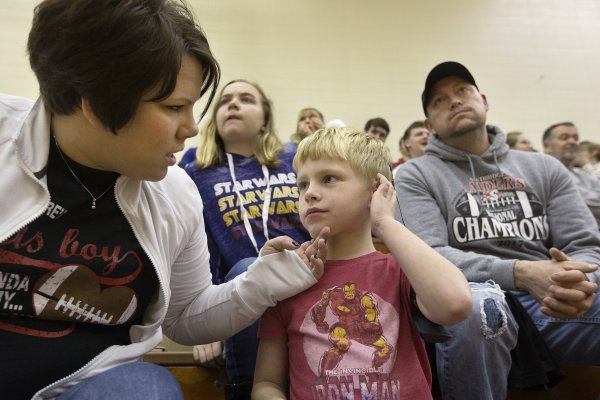Blog
-

Cochlear implant allows young boy to be “just a kid”
 5 Jan , 2018
5 Jan , 2018
Cochlear implant allows young boy to be “just a kid”
When Gehrig Mundy was born six years ago, he failed the infant hearing test, leaving his parents, Amber and B.J., in disbelief.
“We thought it was a false negative,” Amber said.
But when he failed a retest, they knew the result was right: Gehrig couldn’t hear. In the months that followed, the Mundys went through countless appointments, tests and procedures that led to a diagnosis of progressive sensorineural hearing loss. At 3 months old, Gehrig had hearing aids in both ears. At 18 months old, he had total hearing loss in his left ear, and by the time he was 2, he had a cochlear implant in his left ear.
“We just thought if there was an avenue out there to let him hear, we needed to try it,” Amber said.
Still, it wasn’t an easy choice. Getting a cochlear implant involves an overnight stay in the hospital following a four-hour surgery that implants an electrode device under the skin behind the ear and threads wires into the cochlea, which is the inner ear. A removable microphone that sticks to the scalp picks up sounds and feeds them through the implant under the skin.
For the Mundy’s, the surgery meant spending a night at Riley Hospital For Children in Indianapolis. Amber, B.J. and Gehrig’s grandparents, Annette and Bill Mundy, spent the night in the hospital taking turns sitting up with Gehrig.
Once the surgery was complete, the implant took over the function of Gehrig’s inner ear, but it wasn’t like flipping a switch and suddenly he could hear, Amber said. Months of trips to Riley for mapping — the process that programs the implant to the specific needs of the user — followed. As the mapping progresses, the implant allows the wearer to hear more and more sound.
Today, Gehrig wears a hearing aid in his right ear, which still has some natural hearing, and a cochlear implant in his left ear, where Gehrig is totally deaf. He qualifies to have a cochlear implant in his right ear as well, but so far, the Mundys have chosen to let Gehrig use the natural hearing he still has. Someday, Gehrig may choose to have another implant. That option, Amber said, is always on the table.
For now, it seems, Gehrig just wants to be a kid. He’s in kindergarten at Holland Elementary where his day looks like most other students. He and his brothers and sisters — Aidan, 14, and triplets Maddox, Ava and Madeline, 12 (Gehrig’s oldest brother, Jeremiah, 20, is in the Army) — get up at 7 a.m. in their Jasper home, then go to Annette’s house in Huntingburg for breakfast before school.
At school, an aide teaches Gehrig his lessons in American Sign Language first, then in English. Gehrig is learning sign language because it’s what he’ll rely on when he isn’t wearing his implant and hearing aid.
After school, Gehrig gets off the bus at Annette’s where he plays with his cousins until Amber picks him up. When the family gets back to Jasper, the kids do their homework and play together before bedtime.
In the past, playing involved Nerf gun wars and foam sword fights. Now, it sometimes includes video games. Gehrig’s older siblings got new gaming consoles for Christmas, so Gehrig inherited an XBox 360. On his first night with it, Gehrig insisted Amber sit next to him and watch him play.
“Mom, look!” he said after digging out an area while playing Terraria.
“Cool buddy,” Amber said.
Although Gehrig looks and behaves like any other kid, the four years since he got his implant have not been without challenge.
Gehrig didn’t start talking until he was 2 or 3 years old because he couldn’t hear the language spoken around him. And a year ago, a static shock to his implant erased the mapping, putting his hearing back at square one.
For a while, Gehrig wouldn’t wear the implant at all, scared of another shock. Then, when he put it back on, he wouldn’t turn it on. Now, he’s in the process of remapping, and it will be a while before his hearing reaches the level it was before the shock. Amber is confident he’ll get there.
“Whatever he needs, I’ll make it happen,” Amber said.
Source: The Herald
Image credit:Photo by Brittney Lohmiller/The Herald





























































































































































































































































































































































































































































































































































































